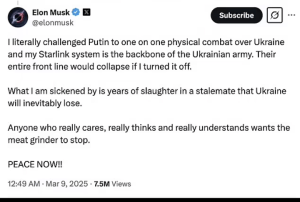Elon Musk’s Ukraine Sanctions Proposal: A Game-Changer or a Distraction?
Billionaire entrepreneur Elon Musk has sparked fresh controversy with his latest suggestion on how to end the ongoing war between Russia and Ukraine. The Tesla and SpaceX CEO called for targeted sanctions on Ukraine’s wealthiest oligarchs, arguing that such a move would bring the conflict to a swift conclusion.
In a post on X (formerly Twitter) on Sunday, Musk wrote, “Place sanctions on the top 10 Ukrainian oligarchs, especially the ones with mansions in Monaco, and this will stop immediately. That is the key to the puzzle.”
The statement marks a significant departure from the current global approach, which has focused on punishing Russia for its unprovoked invasion rather than targeting Ukraine’s elites. The idea has triggered heated debate, particularly in Washington, where the sustainability of continued U.S. aid to Kyiv is a growing concern.
A Radical Shift in Strategy
Since Russia launched its full-scale invasion in February 2022, Western nations have imposed sweeping sanctions on Moscow, crippling its economy and isolating it from global financial systems. Ukraine, on the other hand, has received billions in military and economic aid, with the U.S. and its allies emphasizing that Russia must bear the full cost of its aggression.
Musk’s proposal challenges this approach by suggesting that certain Ukrainian billionaires—many of whom have benefitted from the war—could be pressured into pushing for a peace settlement. His claim that sanctioning oligarchs with luxurious properties abroad would force a quick resolution raises questions about their influence over the war effort.
Political and Public Reactions
The comment comes amid growing skepticism in the U.S. about the long-term viability of financial and military assistance to Ukraine. Republican Senator Mike Lee recently argued that Washington should not send “another penny” to Kyiv, a sentiment that is gaining traction among segments of the American public frustrated by the prolonged conflict.
Musk, who has previously been accused of being sympathetic to Russian interests, fired back at his critics, reminding them of his contributions to Ukraine’s defense. “I literally challenged [Vladimir] Putin to one-on-one physical combat over Ukraine and my Starlink system is the backbone of the Ukrainian army. Their entire front line would collapse if I turned it off,” he stated.

Is Musk Right?
While Musk’s influence in the tech and space industries is undeniable, his political and military strategies have often been met with skepticism. Critics argue that Ukrainian oligarchs, while powerful, do not wield enough control over the government or military to force an end to the war. Others suggest that his comment oversimplifies a complex geopolitical crisis driven by Russia’s territorial ambitions rather than internal Ukrainian corruption.
Still, his remarks highlight a crucial debate: Is there an alternative path to ending the war beyond endless military aid and sanctions on Russia? Could economic pressure on Ukraine’s elite play a role in brokering peace?
For now, Musk’s proposal remains just that—a bold, controversial suggestion from one of the world’s most outspoken billionaires. But in a conflict that has defied all expectations, even unconventional ideas cannot be dismissed outright.
Parrot Newspaper – News That Talks to You


